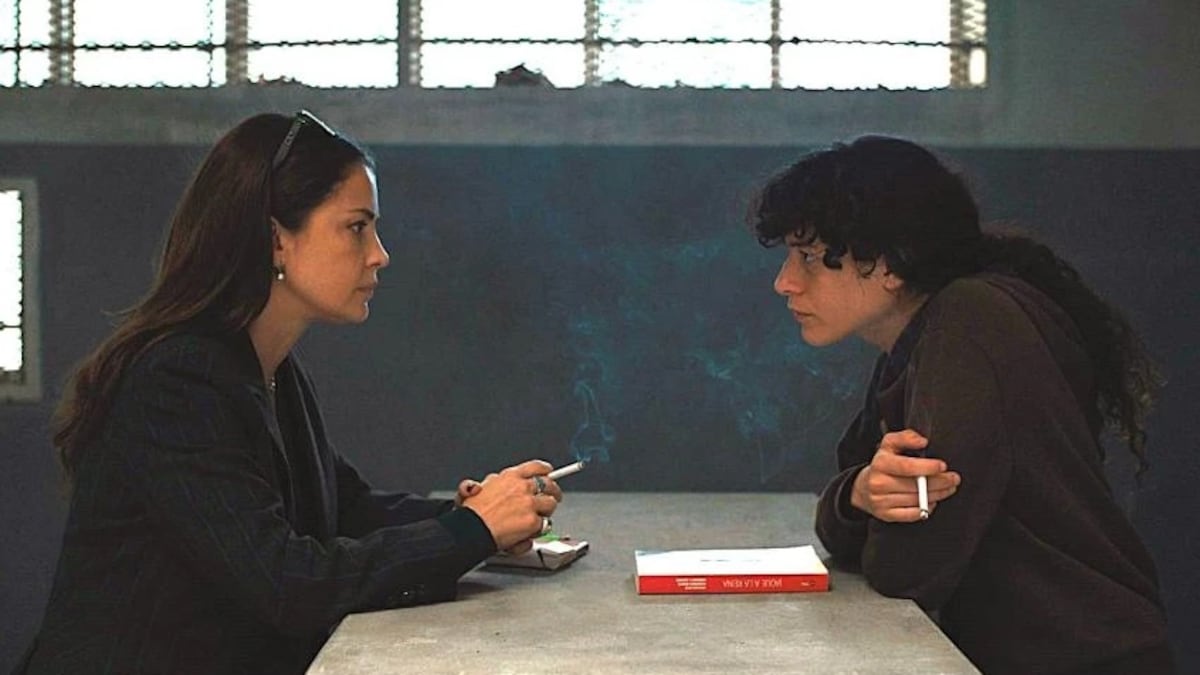‘Belén’, by Dolores Fonzi, and ‘Las Corrientes’, of Milagros Mumbaler, compete in the contest, although the government of his country has ended the public financing of the audiovisual and there will be no films with state aid in 2026 and 2027

What Argentine films with your government’s aid will arrive at theaters in 2026 and 2027? The quick response would be none, according to projects from Argentina in the industry meetings that sponsor in San Sebastián the work in progress (Development films): There is not one of that country, which does add six feature films and a medium -up in the different sections of this zinemaldia.
The reason for such a agorero future is Javier Milei, which leads a government that has emptied financing, and content, the National Institute of Cinema and Audiovisual Arts (INCAA), an agency that regulates cinema within the Ministry of Culture. Last year, the San Sebastián Festival held an act in support of Argentine filmmakers. In this edition the support is faced in another way, through programming, “as a way of certifying its quality and rewarding its career,” said José Luis Rebordinos, director of the contest.

The first to present his work at the festival has been Daniel Hendler. And twice: his 27 nights opened the contest and A loose end, which premiered in the past Mostra de Venice, is projected since Tuesday in the Latin Horizontes section. For the filmmaker, the future is depressing: “With what our cinema has achieved in the world and I see with penalty that, next year, it will be difficult for some Argentine film. What opens today are the titles that come from a previous period. It is a problem for the coming times,” says the actor and director, born in Montevideo, and who has developed his career between his country and Argentina. Yeah 27 nights Born from the producer of Santiago Miter (director of Argentina, 1985), The financing comes from Netflix. A loose end It is produced between Uruguay, Spain and Argentina, a combo that will be difficult to see again by the limitations of Milei.
At the inauguration ceremony, Miter, Hendler and the producer Agustina Campbell stressed that for a long time the industry had negotiated a “that cost to approve” cinema and that when they finally achieved it, accompanying it from its corresponding funds, Milei arrived and put the economist Carlos Pirovano, without prior connection with the cinema, in front of the INCAA. Pirovano made brutal criticism against Argentine cinema, then tempted his statements, and in August he became tangled up when he defended the film A silver man by Gastón Duprat and Mariano Cohn, on a television program … until they asked him if he had seen her. His answer left the audience perplexed: “No, no, I said that I saw Tiktok. When you see a lot of Tiktok, you see almost the entire movie.”

The Argentines present in Donostia insist: “This year there has been no film with support from the Argentine government,” Campbell said. “Argentine films that are scheduled this year in San Sebastián were financed before the arrival of the Milei government or are original platform productions.” The filmmaker Milagros Mumenthaler competes this Tuesday with The currents. The winner of the Locarno Festival in 2011 with Open doors and windows It presents a fascinating portrait of a woman who at the top of her professional and family success feels the need to break everything, although she knows that this impulse arises from a past that she thought she had left behind.
After talking about his movie, meticulous and restless, how Hitchcock has reviewed to remember that each plane matters, explains that The currents It is the last film that received financing from last law. “I, luckily, I am also a Switzerland, and there I looked for more money. “We launched ourselves to shoot, and did well, although there was even a depreciation of the weight that reduced our possibilities.”
Of course, the most popular cinema has received the support, dear or not, from Milei. The aforementioned Man’s silver He has devastated at the box office since its premiere in the middle of August in Buenos Aires. Two days before its launch, Milei projected it in the fifth presidential of Olivos, on the outskirts of Buenos Aires, with deputies of his party. After the premiere, Milei once again scheduled some of the stories to his Council of Ministers. For Milei, the film illustrates the cultural battle against the left that heads since he came to power.
n “}},”video_agency”:false,”alt_image”:”TRAILER BELÉN”},”url”:”https://imagenes.elpais.com/resizer/v2/XAG3XCH47RF25NH764BUGHLTH4.jpg?auth=83b8a70010695d882d14a26060b4c745eb7855d3b67304604c286f84f689dbaf&width=1200&height=675&smart=true”,”alt”:”TRAILER BELÉN”,”ogWidth”:16,”ogHeight”:9,”floating”:false});

This Tuesday there is another feature film in the Zinemaldia contest: Belén, of Fonzi Dolores. Also paid by a platform, in this case Prime Video. “It is that although the Milei government is over, which is even more hurried after its defeat in the legislative elections in Buenos Aires two weeks ago, there will be a time without Argentine cinema,” explains the director, producer, screenwriter and protagonist actress. “The image we give in San Sebastián with three films in the contest is a falseing of reality, because we will see in a few months after the emptying of financing.”

Belén was the pseudonym that lawyer Soledad Deza chose in 2016 to preserve the identity of a woman who spent two years in jail after suffering a spontaneous abortion in a hospital in San Miguel de Tucumán, in northern Argentina. It would have happened more, because they sentenced her to eight years in prison for an illegal abortion with all the evidence and instruction manipulated, such as, with a fetus that was not his. Deza, to which Fonzi gives life, managed to appeal for those irregularities. Belén was acquitted by the Superior Court of Tucumán in 2017 and his case began the fight for an abortion law in Argentina: he turned on the green tide spark. “I did not want to make a militant film, but a movie. From her you can draw conclusions, obvious, but it is not made to convince, but to tell. Another thing is if a half of Argentina, the one that voted for Milei, understands that this is a cinematographic event about an injustice, which here concerns the body of the woman. At least, in its premiere in Argentine Salas a few days ago I believe it.” And despite this, it affects: “The government’s response is warlike with the people who go against him and that vapuleo is not innocent, he manages to create fear. In feminism and in the cinema.”

Another of the Argentine filmmakers present in the capital of Gipuzkoa, Cecilia Kang (premieres her first, Eldest son, In Latin horizons), he clearly exposes his analysis: “Despite all the obstacles, despite the definance and the strong destruction that culture suffers, we continue here. The situation of Argentine cinema is alarming because Argentina’s situation is alarming.” To that is what Mumenthaler refers: “Am I optimistic? Well, Milei has been two years old and there are only two others. That’s what I grab. The problem is not only for the cinema, but for the whole nation.”
Your subscription is being used on another device
Do you want to add another user to your subscription?
If you continue reading on this device, you cannot read in the other.
Why are you seeing this?
Arrow
Your subscription is being used on another device and you can only access El País from one device at the same time.
If you want to share your account, change your subscription to the premium mode, so you can add another user. Each will access with their own email account, which will allow you to customize your experience in the country.
Do you have a company subscription? Access here to hire more accounts.
In the case of not knowing who is using your account, we recommend changing your password here.
If you decide to continue sharing your account, this message will be shown on your device and in the other person who is using your account indefinitely, affecting your reading experience. You can consult here the terms and conditions of the digital subscription.
About the firm

He is editor of the Culture Section, specialized in cinema. In the newspaper he worked before, the spectator and temptations. He started at local radios in Madrid, and has collaborated in various film publications such as Cinemania or Academia. He has a degree in journalism from the Complutense University and Master in International Relations.
More information



